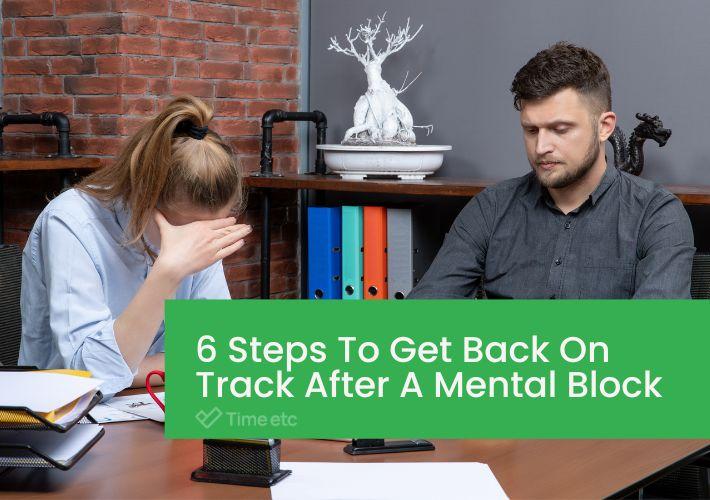A staggering 85% of people report being disengaged at work. A significant portion of this disengagement can be attributed to mental blocks that prevent individuals from focusing on their work.
This can prove to be especially challenging for business owners, as it can seriously affect creativity, decision-making, problem-solving, and productivity, all vital components for successful growth.
Mental blocks can be incredibly frustrating and disruptive to our workflow, but it is possible to break through them.
Here, we'll be exploring how to identify these mental barriers and proven strategies for overcoming them.
Keep reading to find out how you can start making progress again.
What is a mental block?
Whether it's “blank page syndrome” for writers, “blank canvas paralysis” for artists, "brain fog", or "creative drought", a mental block is an obstacle or barrier that prevents someone from achieving their goals or completing a task.
It's those moments where you feel unable to find the right answer, idea, or solution no matter how hard you push yourself. Or those times when you feel mentally slow and sluggish, and rookie errors are falling through the cracks.
When it seems like you're banging your head against a brick wall, mental blocks can be a very real and difficult problem to overcome. This is especially true for business owners who often have a lot riding on their ability to think creatively and solve problems. This can cause projects to come to a standstill, leaving you struggling to find a solution to move forward.
What causes mental blocks for entrepreneurs?
No matter who you are, the possibility of experiencing a mental block while working is very real. There are a variety of different factors that can cause them, but unfortunately for business owners, the main causes of mental blocks also happen to be closely associated with the entrepreneurial lifestyle.
Mental exhaustion
It's not just our bodies that can suffer when they're pushed beyond their limits. Similar to the effects of physical overexertion, mental exhaustion is usually the result of intense ongoing stress or mental activity.
An overwhelming workload, a high-pressure job, and uncertainty about the future are among some of the most common culprits for feeling mentally exhausted. Sound familiar?
According to experts, most entrepreneurial stress boils down to:
- Role ambiguity: Unlike a typical employee, entrepreneurs do not have a boss or manager to provide them with direction or guidance, which can make it difficult to effectively assess their own performance.
- Job versus non-job conflict: Struggling to balance the demands of your work with your home life.
- Concern for quality: Striving to maintain high standards in your business's products or services.
- Role overload: When the demands of your role exceed your time, energy, and capabilities to meet them.
- Responsibility pressure: Whether your venture succeeds—or fails—rests solely on your shoulders.
Most business owners find that these factors rarely exist in isolation. Rather, they all combine to form a vicious cycle of stress and overwhelm.
For example, the pressure to run a successful business could lead to you focusing on delivering the highest-quality products or services. In order to do that, you take on extra work and additional responsibilities. But with only so many hours in a day, you find yourself working more and more hours, leaving less time to spend with loved ones or to properly rest and recharge. On top of all this, there is no one to reassure you that you are on the right track or to highlight areas of improvement, and this uncertainty can lead to increased feelings of pressure.
Lack of sleep
Similar to why the effects of mental exhaustion can be so debilitating, a lack of proper rest can make it tough for our brains to work at their usual capacity.
As the old saying goes, "A good night's sleep clears the mind", and according to research from the University of Rochester, there's more truth behind it than we realized.
While we're awake, our brain cells release beta-amyloid proteins, which are essentially waste byproducts as a result of our mental activity throughout the day. When we're asleep, our brain's glymphatic system activates to clear these damaging molecules away and prevent them from building up.
So when you don't get enough sleep, these toxic proteins remain in your brain cells, seriously impacting your ability to think clearly, solve problems, and effectively manage stress and emotions. And while many of us opt for a trusty caffeine fix to help us feel switched on in the mornings, there's no substitute for the restorative power of the glymphatic system.
“The brain only has limited energy at its disposal and it appears that it must choose between two different functional states—awake and aware or asleep and cleaning up,” said lead researcher Maiken Nedergaard, M.D., D.M.Sc. “You can think of it like having a house party. You can either entertain the guests or clean up the house, but you can’t really do both at the same time.”
Unfortunately, though, sleep deprivation is rampant among entrepreneurs, with a recent survey finding that around 50% are sleeping less than six hours a night.
With only so many hours each day to get everything done, many see this as a necessary evil. It's easy to fall into the trap of thinking that cutting out an hour or two off your recommended seven hours of sleep will give you up to 14 more productive hours each week, but in reality, this isn't quite true. Even though you're spending more time working, any gains in productivity you hoped to achieve will likely be offset by the negative impacts on your performance as a result of your lack of sleep.
See: How To Boost Your Energy When It Feels Like You're Running On Empty
Imposter syndrome
Self-doubt and the fear of not being good enough can be incredibly overwhelming, and if you're unable to shake these feelings of inadequacy, it can be an enormous source of stress—also known as "imposter syndrome".
If you've ever found yourself questioning whether or not you're doing enough to be successful, you're certainly not alone.
84% of entrepreneurs and small business owners have reported experiencing imposter syndrome, with over 20% feeling like their success is purely down to luck. These figures come as little surprise when you read about the five basic types of imposter syndrome, and how closely they align with the experience of starting and growing your own business:
- The Perfectionist: Unless everything you do is absolutely perfect, you can't possibly be as good as others might think you are.
- The Expert: The belief that you don't deserve the rank of "expert" because you don't know everything there is to know about a particular subject, or because you haven't completely mastered every single step in a particular process.
- The Natural Genius: Feeling like a fraud simply because you don't believe that you are naturally intelligent or competent, i.e. if you don't get something right the first time around or it takes you longer to master a certain skill.
- The Soloist: Questioning your competence and abilities simply because you had to ask for help or support.
- The Superperson: The belief that you must be the hardest worker or reach the highest levels of achievement possible and, if you don't, you're a fraud.
It is also thought that those who are self-employed and work independently are more likely to experience imposter syndrome because so much of their success rides on their own belief and confidence in delivering a quality product or service. Going it alone means they're likely to lack bosses, managers, or team members to provide guidance and reassurance when self-doubt starts to creep in (a prime example of role ambiguity in action).
Impacts of mental blocks on productivity and business growth
Mental blocks can have a huge impact on productivity and business growth. They can cause you to procrastinate, become overwhelmed, and generally struggle to make progress on your goals. This, in turn, leads to missed deadlines, unfinished tasks, and decreased motivation—all of which can put a strain on your business’s performance.
Not only that, mental blocks can negatively affect your confidence and self-esteem. When you're unable to make progress on your goals or complete tasks in a timely manner, it affects your sense of self-worth and ability to take risks. This can lead to further procrastination and the potential for greater losses in the future.
What can you do to defeat mental blocks and get back on track?
As the intense and demanding nature of the entrepreneurial lifestyle puts business owners at greater risk of encountering mental blocks, as well as the significant risks they pose to business productivity and success, this makes it all the more important for entrepreneurs to have a strategy in place for overcoming mental blocks.
The good news is that there are several ways to overcome mental blocks so that you can get back on track. Here are six of them...
1. Identify your block
The first step in overcoming your mental block is identifying what it is that’s causing it so that you can address it directly, rather than just trying to ignore it or push through it without addressing the root cause.
Take some time alone or with someone else to find out what might be causing your mental block. This could be down to increased pressure you've been feeling, a heavier workload, or not getting enough sleep. Identifying what's the source of the problem helps you know exactly what you need to work on in order to move forward again with your business goals, tasks, and projects.
2. Take a break
When you've been stuck on a task for a while and feel like you're getting nowhere, you'll find that you become more focused on your mental block itself (and how frustrated you feel) than the task itself.
Rather than trying to force yourself through the block and risk wasting more time and raising your stress levels further, taking some time out for a break is often the best solution in this scenario.
Whether it’s a walk to the kitchen to get a drink or ticking some smaller tasks off your list of to-dos, these little moments of respite may be all you need to refresh your mind and approach your task with a new perspective when you return.
See: Why Scheduling Creative Time Is Crucial For Success
3. Avoid overextending yourself
Many of the factors that contribute to mental blocks listed above, such as mental exhaustion, role overload, and lack of sleep, are simply down to doing too much. Others, like imposter syndrome and responsibility pressure, are what make us want to do too much in the first place.
If you find yourself frequently in the grip of mental blocks, it's worth taking a step back to assess your current responsibilities and see if there are any areas where you can lighten the load.
See: Why You Should Write A "Stop-Doing" List Instead Of A To-Do List
4. Reprogram your mind
Your mental blocks may be caused by limiting beliefs and negative thought patterns that are subtly sabotaging your progress.
Humans have a tendency to retreat from uncomfortable or intimidating scenarios, as this is an instinctual defense mechanism. Known as the fight-or-flight response, it has been instilled in us since birth and is intended to keep us safe. However, in today's world, our brains may trigger a mental flight response to try and escape situations where we could potentially feel embarrassed or foolish (i.e. when imposter syndrome rears its ugly head).
Reprogramming your mind means making an effort to replace these negative thought patterns with more positive ones.
When that dreaded voice of doubt begins to creep in, take the time to speak back to it. Remind yourself that you have a solid set of skills and abilities that have got you to where you are today and will take you through whatever comes your way.
Make a list of your accomplishments and successes, look back through past emails from clients or colleagues praising your work, read through positive customer reviews for your business—anything that will help restore your self-belief.
5. Make sleep a priority
Just because you're able to get by on less than the recommended seven to nine hours each night, it doesn't mean that the sleep you are getting is enough to function at your best—both physically and mentally.
This is something that some of the world's most successful entrepreneurs have learned the hard way. After she collapsed from exhaustion, hit her head on her desk, and broke her cheekbone, The Huffington Post founder Arianna Huffington realized she needed to make a serious change. Since making changes to her sleep habits, her life has seen a dramatic turnaround for the better.
"I began getting 30 minutes more sleep a night until gradually I got to 7 to 8 hours. The result has been transformational," she explained in a recent interview. "All the science now demonstrates unequivocally that when we get enough sleep, everything is better: our health; our mental capacity and clarity; our joy at life; and our ability to live life without reacting to every bad thing that happens."
6. Focus on the present
When you focus too much on the past, such as mistakes you’ve made or goals that have not been achieved, it can lead to feelings of guilt and shame, which in turn can result in more mental blocks. Focusing too much on the future, such as what could go wrong or what needs to be achieved, can also increase anxiety and stress levels.
The key here is to focus on the present moment and consciously make an effort to stay in the here and now. This means slowing down your thoughts, being mindful of what you’re doing, and focusing on the task without letting any external pressures or worries get in the way.
What's the bottom line?
In any entrepreneur's life, feeling stuck can happen at some point. But this doesn't have to stop you from pursuing your goals and growing your business. It is entirely possible to break out of that rut and move forward, and these tips are a great place to start.
Effective time management, concentration on the here and now, reprogramming yourself mentally, and making sure you're well-rested can make breaking through those mental barriers much easier!







